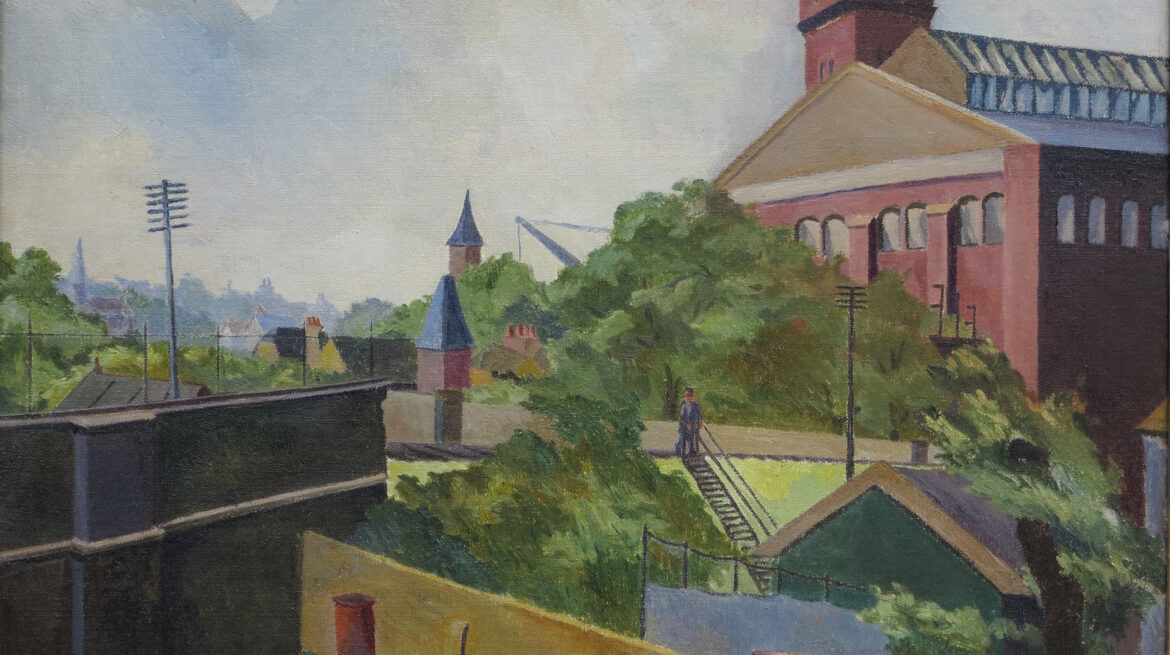
4 October - 22 December
Bow Arts is delighted to present an exhibition exploring the past and present of east London, bringing together the historical paintings of the East London Group with their 21st century contemporaries.
Inspired by the East London Group’s scenes of the old East End, 22 painters from the Urban Contemporaries group and invited guests, including David Hepher, Doreen Fletcher, Ben Johnson, Philippa Beale, Timothy Hyman RA and Harriet Mena Hill, have created new works to be shown alongside their historical counterparts.
Exploring the artists’ shared passion for immortalising, celebrating, and unpicking the streets and scenes of east London, the show will explore the city across time – remembering long-demolished buildings, revealing hidden streets, and celebrating communities from the 1920s to the present day. A newly commissioned sound piece, made by artist felix taylor will also provide an atmospheric soundscape to the exhibition, a composition made up of bells, fog horns, pipe organ, piano, human voice, percussion and sounds recorded around Bow, East london.
The historic East London Group began with evening painting classes in Bethnal Green; made up of mostly working-class men and women, the group painted what surrounded them – the East End – capturing their city in a way never previously seen. Taught by painters John Cooper (1894-1943) and Walter Sickert (1860-1942), amongst others, the group became enormously successful despite the class prejudices of the time, exhibiting at Whitechapel Gallery and National Gallery, Millbank (now Tate Britain) and representing Britain in the Venice Biennale in 1936.
Only in recent years has the Group gained the historical recognition it deserves, and this show will present work from artists including Elwin Hawthorne, Cecil Osborne, Grace Oscroft, Henry Silk and the Steggles brothers, including works never previously seen publicly. Viewers will be able to explore Bow Road, Bethnal Green, and Grove Hall Park (behind the Nunnery Gallery), as well as canals, lumber yards and breweries, witnessing through these fascinating depictions the face of a changing London during the inter-war years.
The accompanying contemporary works explore a city changing at an even faster rate, capturing the buildings that have been dismantled and recreated, and the historic remnants that defiantly remain. Ignited by stories, of the artist’s own memories, ancestry, or research, these paintings are layered urban interpretations and though often personal, are inevitably shared by the others who walk these streets and call them home. With subjects including the brutalist Robin Hood estate before its demolition, the regenerated walkways of east London’s canals, and the ever-growing urban skyline, many of the works will hang next to their historic inspirations, presenting an intriguing comparison between the London of now, and that of nearly 100 years ago.
The musical elements in felix taylor‘s sound piece represent different aspects of the paintings in the exhibition, from the Guardian Angels church through the pipe organ to the aged upright piano referencing the various portraits of 1930s homes. A constant, ever changing reverberation of bells runs throughout the piece, referencing the Bow bells and the echoes of places that appear in both the East London Groups’ and the Urban Contemporaries’ paintings. Foley in the piece represents the different occupations the East London group held alongside, before or after their painting careers. Fog horns of the docks, the bike of an errand boy, printing presses, window cleaning and construction work.
Field recordings paint literal footsteps through east London with workshop participants local to the area recording sounds found around Bow, encouraged to hear the area the same way the East London Group saw it. The piece is punctuated by samples of compositions written and performed by the local workshop participants. They wrote graphic scores, painting abstract sound portraits of what east London meant to them. The scores were then interpreted and performed by the group using voice and percussion
Exhibiting artists (Urban Contemporaries): Philippa Beale, Alexandra Blum, Tim Craven, Frank Creber, Gethin Evans, Ferha Farooqui, Annette Fernando, Doreen Fletcher, Marc Gooderham, David Hepher, Harriet Mena Hill, Timothy Hyman RA, Ben Johnson, Michael Johnson, Sarah Lowe, Fiona McIntyre, James MacKinnon, Alex Pemberton, Nicole Poh, Hilary Rosen, Melissa Scott-Miller, Grant Watson.
Exhibiting artists (East London Group): Phyllis Bray, George Board, Elwin Hawthorne, Lilian Leahy, Cecil Osborne, Grace Oscroft, Henry Silk, Harold Steggles, Walter Steggles, Albert Turpin.
The exhibition has been curated by Alan Waltham (East London Group) and Ferha Farooqui and Frank Creber (Urban Contemporaries) together with the Nunnery Gallery.
About Urban Contemporaries
The Urban Contemporaries Group was set up in 2019 by Ferha Farooqui and Frank Creber to bring together figurative painters, interested in exploring the urban experience. They curate ambitious responses to subjects, responding with drawing as a starting point, painting as the common medium and individual encounters with urbanised life as the dominant motif. They conceive themed shows that reflect upon the urban condition.
Opening hours: Tues-Sun, 10am to 4pm
181 Bow Road, E3 2SJ
Late Opening: Thursday, 5th December, 6-9 pm